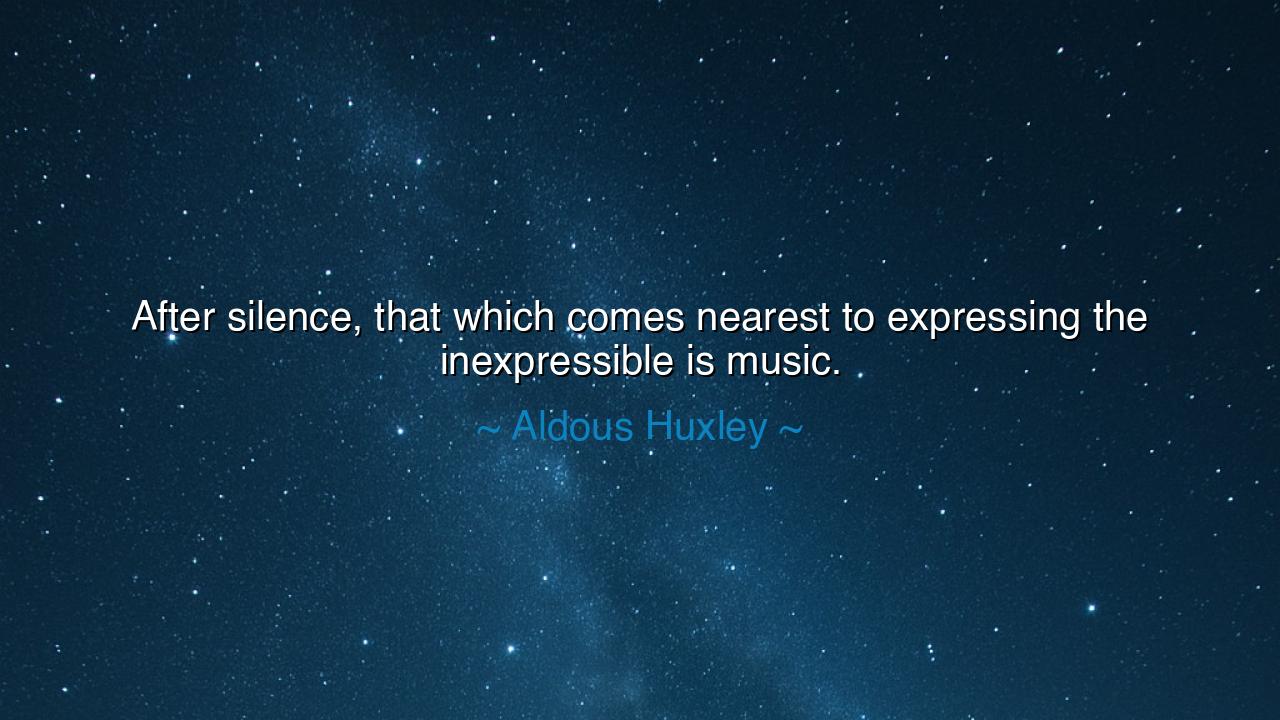
After silence, that which comes nearest to expressing the






Aldous Huxley, seeker of wisdom and observer of the human soul, once declared: “After silence, that which comes nearest to expressing the inexpressible is music.” In this saying lies a truth as ancient as the dawn: that there are mysteries too deep for words, sorrows too heavy for speech, joys too radiant for language. When the tongue falters and the pen fails, the heart turns first to silence, and then to music, which carries the unspeakable into sound.
To call silence the first expression is to honor its sacred power. For before words, before instruments, before the clamor of life, there was stillness. In silence, the soul communes with the eternal, listening for the whisper of truth that cannot be clothed in syllables. The mystics of every faith have known this: that to meet the divine, one must first embrace the hush. Yet man cannot always remain in silence. The soul, overflowing with what it has seen, yearns to speak. And when speech is insufficient, it is music that arises as the bridge between the finite and the infinite.
Huxley speaks of the inexpressible, those realities too vast to be contained in human language. How can grief be fully described? How can love be wholly named? How can awe at the heavens or trembling before mortality be put into words? The poets try, the philosophers attempt, but still something escapes. Yet when a melody rises, when chords swell or a lone violin trembles, suddenly the heart knows: here is what words could not reach. In this sense, music becomes the tongue of the soul, the voice of what lies beyond reason.
History itself bears witness to this truth. Think of Beethoven, struck deaf in his later years, yet composing symphonies that thundered with the triumph of the human spirit. He could not hear the notes with his outer ear, yet his inner ear reached into the realm of the inexpressible, drawing forth sounds that carried the weight of sorrow and the ecstasy of joy. When his Ninth Symphony was first performed, the audience wept and rejoiced, for though they could not put their feelings into words, music had spoken it for them.
The ancients too turned to music when words failed. The Hebrews sang psalms, the Greeks intoned hymns, the Hindus chanted mantras—all recognizing that there are truths only sound can carry. In moments of both mourning and celebration, people did not always debate or explain; they sang. For in the song, the community touched together what could not be reasoned, only felt. Silence gave way to music, and the inexpressible was honored, if not defined.
The meaning of Huxley’s words is thus both humbling and uplifting. They remind us that language, though powerful, has its limits. We must not despair when words cannot capture the depth of our soul. Instead, we should remember the two eternal companions: silence, where truth is received, and music, where truth is revealed. Together they teach us that the deepest realities are not explained but experienced.
For those who hear this wisdom, let it guide your life. When you are overwhelmed by sorrow, seek silence first, and then let music carry what you cannot say. When joy bursts from your heart but words seem small, sing or play, and let the melody bear your gratitude. When you wish to understand others, listen not only to their speech but also to their silence, and to the music they hold dear.
Thus Huxley’s words endure: “After silence, that which comes nearest to expressing the inexpressible is music.” Let them remind you that there are truths beyond the tongue, mysteries beyond the mind. Honor silence, cherish music, and know that in them both lies the key to what cannot be spoken, yet must be felt.






AAdministratorAdministrator
Welcome, honored guests. Please leave a comment, we will respond soon